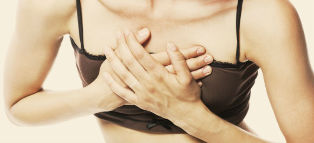If it hurts the breasts and gives it back, you probably have a problem with the internal organs interested in the offers in the chest or back. If you have with this field have previously been injuries, e.g., rib fractures, thoracic trauma, trauma of the spine, while by the time you experience pain, can be a result.
It also happens that the pain of a man worried for a long time, and painkillers only provide a temporary relief, in this case, very probably, is of a chronic or progressive disease that requires immediate treatment. Let's consider some diseases, the symptoms is the chest pain, pain that radiates to the back.
If it hurts and the breast gives behind-the possible causes

Organs of the chest are fairly close to one another, and the sensation of pain occur in an organ, can be deployed on another, to give different parts of the body, for example, in the lower part of the back, arm, neck, abdomen. Sometimes the pain in the chest, damage to the rear, this happens in the following diseases:
1 reason - Problems with the skeleton
Problems with the skeleton, that is, the curvature of the spine, such as scoliosis, lordosis and kyphosis. They are all in the later stages are accompanied not only visible defects, such as, for example, asymmetry in the area of life, of the shoulder blades and shoulders for scoliosis and the pain. Usually you experience pain in the chest, gives to the back, sometimes in an arm or neck, the man tries to take a more comfortable position, usually, distortion of the spinal column. When curvature of the spine time do not correct the man loses the ability to be in the right place: with backrest, smooth, symmetrical shoulders, without deviations in the lumbar and thoracic, and every year the situation will only get worse. In addition, pain in the chest, pain that radiates to the back can be caused by an inflammation of the rib cartilage, or as it still call it the disease – the disease Tietze. With her in a place of transition of cartilage (rib), the sternum is formed in the gasket, painful swelling. With the pressure on her, the pain is increased, such as when you cough and laughter. Often, the pain in my chest me in the back, especially when you change the position of the body.
2 the reason - Diseases of the digestive system
Diseases of the digestive tract may be accompanied by pain in the chest, that gives back. In particular, it is typical for the development of cholecystitis in the absence of treatment, is an acute pain occurs in the chest, extending to the rear and door herpes character, then occurs the nausea and raises body temperature, which is accompanied by a fever. Spasm of the esophagus, also causes pain in the chest, me in the back. When the painful sensations are against nature, and their appearance is associated with the intake of food. In some of the cancer diseases of the digestive tract observed pain in the chest, pain that radiates to the back, here, it is very important to make a diagnosis and start treatment. Unfortunately, the cancer of the digestive organs, the pain often occurs when the tumor has already affected a wide area.
Reason 3 - Diseases of the heart and blood vessels
An attack of angina (a condition that occurs due to lack of blood supply to the heart muscle) is characterized by a sharp pain in the chest, pain that radiates to the back. The pain is concentrated in the left part of the body, and shortness of breath, lack of air, and a sense of fear. Often, angina occurs due to excessive physical activity is not inexperienced people, often advanced in age. Even if it hurts the breasts, gives back, then this may be a symptom of a serious disease, that is to say a massive pulmonary embolism. In this disease there is an obstruction in the gaps of the pulmonary arteries, as a result, you experience a lack of oxygen. During an attack a person is missing the air, you feel a sharp pain in the chest, me in the back, and the breathing becomes frequent and superficial.
If the pain in the chest gives back, and cares enough often, it makes sense to pass the exam, especially if it is accompanied by symptoms such as lack of air, fainting, or signs of problems from the gastrointestinal tract.

























